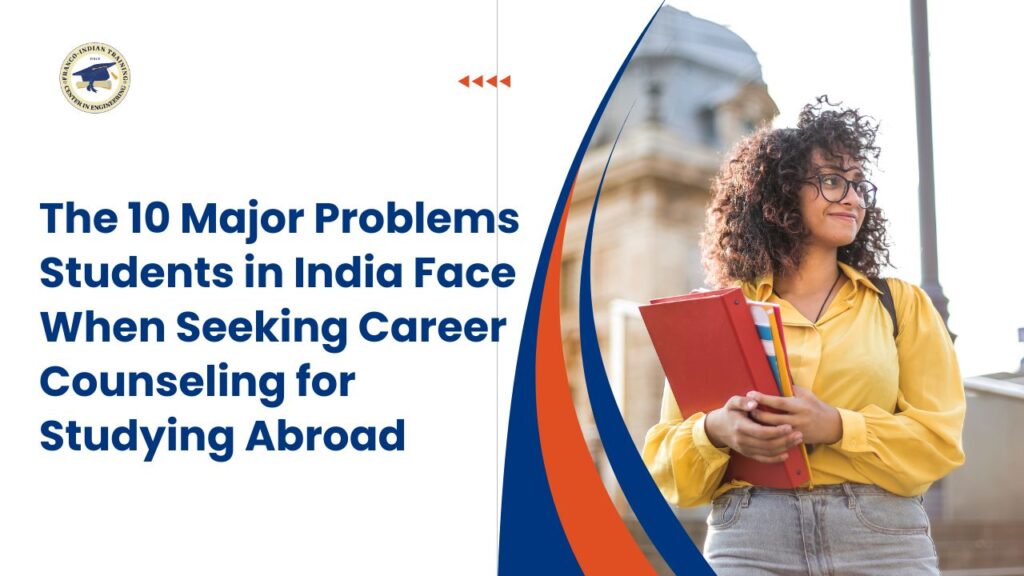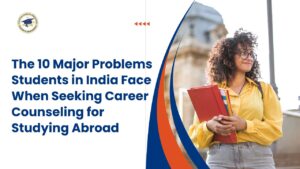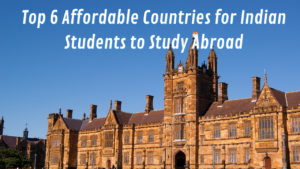
Introduction
The dream of studying abroad comes with its set of challenges, especially for students in India. From financial constraints to unreliable counseling, students often face roadblocks that make the journey more stressful than it should be. Effective career counseling should help students make well-informed decisions, but in many cases, it falls short. In this article, we will examine the major problems students encounter when they seek career counseling for studying abroad.
Table of Contents
Lack of Awareness
Narrow Focus on Limited Countries
Many Indian students and their families tend to focus on a limited number of popular destinations like the USA, UK, or Australia. While these countries offer excellent education, students often overlook other emerging destinations like Germany, Canada, or the Netherlands, which may offer better opportunities based on their specific fields of interest.
Misunderstanding of Available Courses and Opportunities
A major problem in career counseling is the lack of understanding regarding the vast number of courses and degrees available abroad. Students often miss out on innovative or specialized programs because they are only exposed to conventional options like engineering, medicine, or business.
Financial Constraints
High Costs of Studying Abroad
The cost of studying abroad is a significant challenge for many Indian students. Between tuition fees, living expenses, and travel costs, studying overseas can quickly become unaffordable. Unfortunately, career counseling often fails to provide comprehensive financial planning, leaving students unsure of how to manage the costs effectively.
Lack of Scholarship and Financial Aid Guidance
Many students are unaware of the scholarships, financial aid, and other funding options available to them. Proper career counseling should provide detailed information on scholarships and assist students in applying for financial aid. However, this is an area where counseling often falls short.
Unreliable or Misleading Counseling
Profit-Driven Counseling Agencies
Some career counseling agencies in India prioritize profit over the student’s best interests. They may have partnerships with certain universities and push students toward these institutions, regardless of whether they are the right fit.
Biased Recommendations
Counselors might recommend universities or courses based on financial incentives rather than the student’s academic goals or career aspirations. This results in students making decisions that aren’t aligned with their best interests.
Limited Understanding of Global Career Trends
Outdated Knowledge Among Counselors
The world is changing rapidly, and so are global career trends. Unfortunately, many career counselors in India may not be up-to-date with the latest industry trends, global demand, and future job opportunities. As a result, students may pursue degrees in fields that are not as promising on the global stage.
Lack of Exposure to Emerging Industries
In many cases, counselors fail to provide guidance on new and emerging fields like artificial intelligence, digital marketing, or environmental sciences, which are growing in demand internationally. This can limit students’ career prospects in the long term.
Insufficient Personalized Guidance
One-Size-Fits-All Counseling
Most students receive generic counseling, which doesn’t account for their unique interests, strengths, or academic backgrounds. What works for one student may not work for another, yet many counseling sessions follow a “one-size-fits-all” approach.
Missing Tailored Career Path Planning
Career counselors often fail to create a personalized career plan for students. Instead of helping students figure out the best path to reach their academic and career goals, counseling sessions tend to be more about filling out forms and meeting deadlines.
Overwhelming Application Process
Complex Application Requirements
Applying to universities abroad involves a series of complex tasks, including standardized tests (like GRE, GMAT, or IELTS), submitting SOPs (Statements of Purpose), and gathering recommendation letters. Many students feel overwhelmed, and inadequate support during this process only makes it more difficult.
Insufficient Support for Documentation
Preparing the necessary documentation for studying abroad is a challenge for many students. From visa applications to university forms, navigating through this paperwork can be stressful without the proper guidance, which is often missing in counseling sessions.
Language Barriers
Lack of Language Preparation
For students studying in non-English-speaking countries, the language barrier is a major hurdle. Unfortunately, many career counseling sessions do not emphasize language preparation, leaving students underprepared for the challenges they may face abroad.
Cultural Adaptation Issues
In addition to language barriers, students must also adapt to new cultures. Many career counselors overlook this aspect, failing to prepare students for cultural differences and the adjustments they need to make when living in a foreign country.
Lack of Information on Post-Study Work Opportunities
Misunderstanding of Visa Regulations
A significant number of students are unclear about post-study work visa regulations in their target countries. Career counselors should provide detailed guidance on how to navigate these rules, but often this information is insufficient or missing altogether.
Limited Knowledge of Job Markets Abroad
Career counseling should help students understand the job market in the country they wish to study in, yet many students are left in the dark about job prospects after graduation. This can lead to difficulties in securing employment post-studies.
Peer and Parental Pressure
Influence of Family Expectations
Indian students often face pressure from their families to pursue particular courses or go to specific countries, even if these choices don’t align with their own interests. Career counseling needs to address these concerns, but it frequently fails to mediate such pressures.
Popular Trends vs. Personal Interests
The popularity of certain fields, such as engineering or medicine, may sway students to choose these paths, even if they aren’t genuinely interested. Counselors should encourage students to follow their passion, but this doesn’t always happen.
Limited Support for Non-Traditional Fields
Focus on Conventional Courses
Many career counselors in India focus on traditional fields like engineering, medicine, and management, with limited understanding of or support for emerging or non-conventional fields. This puts students with diverse interests at a disadvantage.
Lack of Guidance in Emerging Fields
For students interested in fields like media, design, or environmental sciences, there is often a lack of proper counseling. These students may struggle to find the right guidance for courses and universities that cater to their unique career aspirations.
Conclusion
In conclusion, while career counseling is essential for students seeking to study abroad, it comes with several challenges. From unreliable guidance to financial constraints, students face many obstacles that can make the process overwhelming. However, with the right information and support, students can navigate these issues and successfully pursue their dreams of studying abroad.
FAQs
What should I look for in a reliable career counselor?
A reliable career counselor should provide personalized guidance, be transparent about costs, and offer unbiased recommendations based on your interests and goals.
How can I afford to study abroad if I have financial constraints?
Explore scholarship opportunities, apply for financial aid, and consider studying in countries that offer affordable education or part-time work options for international students.
Is there support for students pursuing non-traditional fields?
Yes, there are growing opportunities for students interested in emerging fields. Look for career counselors who are knowledgeable about these areas.
How can I overcome language barriers when studying abroad?
Take language preparation courses, engage in language exchange programs, and immerse yourself in the local culture to improve your language skills.
What are the key factors to consider before selecting a study abroad destination?
Consider the country’s educational system, career opportunities, cost of living, visa regulations, and cultural environment when selecting your study abroad destination.
Top 6 Affordable Countries for Indian Students to Study Abroad


